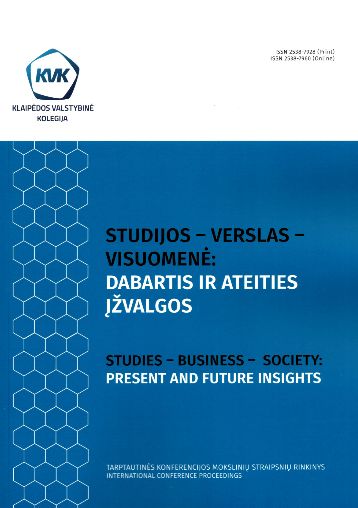COOPERATION BETWEEN TEACHERS AND PARENTS IN EDUCATING CHILDREN WITH BEHAVIOURAL DIFFICULTIES: THE PERSPECTIVE OF EDUCATORS
DOI:
https://doi.org/10.52320/svv.v1iVII.231Keywords:
Behavioural difficulties, teacher-parent cooperation, educationAbstract
Behavioural difficulties are signs of behavioural disorders that do not reach the level of disorder, which interfere with a person's socialization and self-expression. These difficulties are divided into the following stages: oppositional disobedience, offensive and aggressive behaviour, antisocial behaviour, delinquent behaviour can mean inappropriate, unacceptable, aggressive, provocative, insolent behaviour in a certain environment or situation (Barkauskienė and Zacharevičienė, 2019). Children with behavioural difficulties are characterized by a lack of social skills, disobedient behaviour, aggressiveness. Recognizing behavioural difficulties in children is difficult, it is important to know what behaviour is typical for different age groups of children. Early signs of behavioural problems are observed in infancy, children have a difficult temperament, do not adapt to various changes in the environment and care. At preschool age, tantrums, disobedience, aggression towards animals and peers begin to appear (Breidokienė and Ignatovičienė, 2015). Most often, children with behavioural difficulties, due to inappropriate behaviour during education, lag their peers in intellectual and cognitive abilities and educational achievements (Geležinienė, Vasiliauskienė et al., 2010). According to Schell, Albers et al., (2015), these children have lower social and emotional skills, because of which they behave aggressively in conflict situations, have a lower ability to empathize, and maintain long-term friendships. Educational methodological recommendations (2018) indicate that children with behavioural difficulties do not follow group rules, do not maintain friendly relations, find it difficult to make friends, avoid activities, do not trust adults and peers. By understanding the origin of such behaviour in time, it is possible to prevent behavioural disorders (Barkauskienė and Kundrotienė, 2014). Only smooth cooperation between parents and the educational institution can ensure effective help for the child in overcoming behavioural difficulties (Burvytė, 2013).
The problem of the research. The main support for children is their family, only joint work can make the life of children with special needs joyful and meaningful. Barkauskienė and Zacharevičienė (2019) indicated the main principles that an educational institution should follow when educating children with behavioural difficulties: child welfare and interests, reasonableness of help, early and timely help, individualized help, teamwork and shared responsibility, cooperation between the educational institution and family. Family-school cooperation is very important in overcoming children's behavioural difficulties in preschool education, but there is a lack of research that analyses cooperation in detail in educating children with behavioural difficulties. The question that reflects the research problem arises: what forms and methods of cooperation with parents do teachers use in educating children with behavioural difficulties?
The object of the research is cooperation between teachers and parents.
Downloads
Published
How to Cite
Issue
Section
License
Copyright (c) 2022 Deimantė Bacevičė, Aurelija Valaitienė

This work is licensed under a Creative Commons Attribution 4.0 International License.
Individual articles are published Open Access under the Creative Commons Licence CC-BY 4.0, which permits unrestricted use, distribution, and reproduction in any medium, provided the original author and source are credited. Authors retain copyright in their articles, but grant Klaipėdos valstybinė kolegija the right of the first publication.

